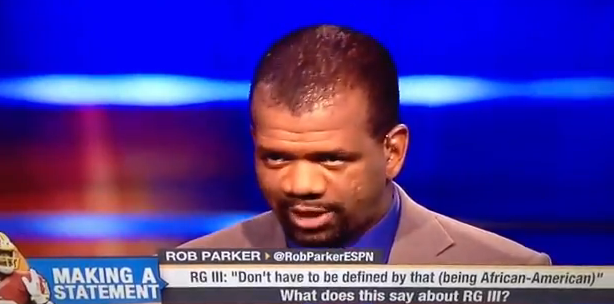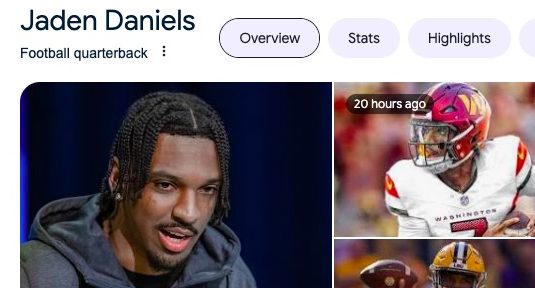For many, the Rob Parker saga may seem like a trilogy; he arrived on the national scene with appearances on a variety of ESPN platforms while saying controversial things about stats and other topics, took controversy to new heights with "cornball" comments about Washington Redskins quarterback Robert Griffin III, and then was suspended for his Griffin comments and saw ESPN decline to renew his contract. Veni, stupidi, departi. Yet, just as the preceding isn't entirely a correct Latin translation, the Parker story is a little more complicated than that. It's worth exploring what led to Parker's comments and if they've really meant the end of his national prominence.
While Parker should take the lion's share of the blame for his ridiculous comments about Griffin (after all, he's the one who chose that particular phrasing and the problematic examples he spouted), he's not a lone troll. First Take has long been about presenting the most provocative stances possible, and that's why a guy like Parker was featured on the program in the first place. It certainly wasn't for his journalism skills or his insightful opinions; after all, in his pre-ESPN days, he was demoted (and then resigned) after asking Detroit Lions coach Rod Marinelli whether he wished his daughter had married "a better defensive coordinator" and implicating then-Michigan State quarterback Kirk Cousins in a fight that Cousins was nowhere near.
Parker's long made problematic comments about everything under the sun, including race (for one, he suggested race meant Kevin Love would be a poor NBA player), and he's gotten in trouble for it at most of his jobs, but ESPN has kept promoting him and featuring him more heavily, including tabbing him as the host for a special Saturday edition of First Take shortly before his comments on Griffin. People respond to incentives; when Parker's controversy-stirring, debate-embracing ways kept getting him more and more notice at ESPN, it would be understandable for him to embrace those ways even more. That undoubtedly played a role in his comments about Griffin; his pushing the boundaries of what's acceptable had always been rewarded by ESPN before, so why would this be any different?
ESPN's involvement in the Parker situation is about more than just rewarding his strong stances, too. Keep in mind the history of First Take, which has found ratings success thanks to these kinds of controversial stances. The "embrace debate" philosophy has become so prevalent (and not just at the Worldwide Leader) that it was one of the most remarkable developments of 2012 in the sports media world. It's certainly not just First Take. That show's success has prompted other programs, both at ESPN (see Numbers Never Lie's admitted transformation from a stats show to a debate show and the Facebook debate polls populating SportsCenter) and elsewhere to lean towards extreme positions and intense debates. Sports Illustrated's Richard Deitsch has called this "the Baylessization of some of [ESPN's] programming," and that's spot-on.
Moreover, in a world where debate must be embraced at all costs, it's tough to draw lines thou shalt not cross; that's what makes it so notable that Parker's comments were showcased in ESPN's "Best Of First Take" re-airing that afternoon. For the First Take producers, they clearly weren't out of line. That was also shown during Parker's first interview since the suspension with Detroit NBC affiliate WDIV, where he said the discussion went along lines he'd discussed with producers
" [The show's producers] knew which way we were going and it was not off the cuff," Parker admitted on Flashpoint. "I don't know if [ESPN] enjoyed it. I think they were really hurt by the backlash that came from it. It wasn't meant in that vain at all. The people and the producers and everybody on the show, we just didn't think of it that way. We weren't trying to slam the kid; we were trying to tackle these issues."
That also raises the question of whether or not we've seen the last of Parker. Would he be tempted to pull back the curtain on the inner workings of First Take and just how much the entire operation is geared towards creating controversy? Could Parker try to gain some sort of retribution if he feels wronged for doing what he was presumably promoted to do? That's certainly possible, and if he's able to prove that ESPN suits encouraged him to express opinions like his comments on Griffin and then punished him for doing so, he might be able to get something out of it for himself.
Regardless, it would seem unrealistic to expect Parker to vanish from the public eye. He's proven that he can attract attention, and some media outlet somewhere will view that as sufficient reason to give him yet another platform. We live in a sports media world that wants buzz, pageviews, and trends more than anything, and Parker defines that perfectly, no matter how legitimate it might or might not be. Don't write his career off as a trilogy yet; it may still prove to be "veni, stupidi, departi, reverti." Like Ahnold, he may well yet be back.







